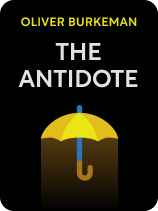

This article is an excerpt from the Shortform book guide to "The Antidote" by Oliver Burkeman. Shortform has the world's best summaries and analyses of books you should be reading.
Like this article? Sign up for a free trial here.
Is there one blueprint for happiness? Do you feel like you’ve tried everything, only to be stuck in discontentment?
Recognizing that life can’t be controlled frees you from the limitations of pursuing constant positivity while enriching your life and revealing joy in unexpected places. That’s the view of Oliver Burkeman, who provides several alternative approaches to well-being and contentment.
Read more to learn how to find happiness in life—in ways you might not have explored before.
How to Find Happiness in Life
Burkeman’s advice on how to find happiness in life draws on a variety of philosophies and ideas—including Stoicism, Buddhism, and the spiritual teachings of Eckhart Tolle—to argue that happiness doesn’t come from striving for constant positivity and control but from embracing life’s uncertainty and imperfections.
(Shortform note: In The Myth of Sisyphus, philosopher Albert Camus argues similarly that insecurity is an essential facet of human life. He explains that there’s a mismatch between this reality and the psychological need for control over life. He refers to this paradox between our desire for security and control and the fact of insecurity as absurdity—and he argues that the only way to deal with it is by embracing absurdity and making the most of our limited time on earth.)
Burkeman emphasizes that there’s no universal blueprint for happiness, and his suggestions aren’t formulas for a happy, ideal life. Rather, they’re flexible tools to help you accept and navigate life as it unfolds, allowing you to find lasting joy, even amid imperfection.
He suggests three approaches:
- Accept all your thoughts and feelings.
- Adopt a flexible attitude toward goals.
- Get comfortable with change and uncertainty.
Let’s explore these three approaches in detail.
Approach #1: Accept All Your Thoughts and Feelings
Burkeman explains that happiness doesn’t come from experiencing only positive emotions but from accepting all your thoughts and feelings, even the seemingly negative ones. This approach helps you avoid the unproductive cycles of forced positivity and self-blame.
Burkeman suggests three methods to help you accept your thoughts and feelings.
Practice mindful observation: Observe your thoughts and emotions impartially, without judgment or attachment. Noticing your thoughts without becoming entangled in them cultivates acceptance. For example, if the thought “I am not good enough” surfaces, simply acknowledge it and let the thought drift away.
Examine your judgments: Burkeman says you should acknowledge that experiences aren’t inherently positive or negative; it’s your judgments that shape your emotional response. This realization fosters acceptance by helping you perceive experiences more neutrally. For example, seeing a traffic jam as an occurrence rather than an inconvenience eliminates the negative connotation and reduces frustration.
Shift to preference-based thinking: Burkeman recommends reframing wants and wishes from being absolute needs to preferences to reduce the stress and disappointment you feel when things don’t go as planned. For example, reframe “I must always have a clean home” to “I prefer a clean home but it’s OK if it’s not always organized” to alleviate distress over occasional disorder.
Approach #2: Adopt a Flexible Attitude Toward Goals
Burkeman suggests that you’re more likely to feel happy and accomplished if you shift from pursuing rigid goals to adopting a more flexible attitude, allowing your goals to evolve with your changing desires and circumstances. This approach redefines your relationship to success by making setbacks seem less like failures and more like learning curves that keep your goals in tune with what matters to you.
He recommends three methods for cultivating a flexible attitude toward goals.
Set adaptable goals: Make your goals flexible from the outset and consistently reevaluate them to ensure they align with your evolving needs, circumstances, and aspirations. For example, instead of focusing on one predefined career path, explore diverse roles to enhance your chances of getting a rewarding job.
Learn from failure: Burkeman says you should analyze setbacks and apply your insights to future efforts. This strategy transforms disappointments into actions you can take to improve, helping you sustain momentum toward your goals. For example, if a promotion eludes you, identify and hone the necessary skills to prepare yourself for future opportunities.
Establish action-based routines: Burkeman says to prioritize completing specific tasks regardless of your motivation levels. This approach emphasizes doing over feeling, fostering a commitment to take action that ensures continual progress toward your goals. For example, dedicate the first hour of your day to crucial tasks to guarantee daily advancement regardless of your motivational state.
Approach #3: Get Comfortable With Impermanence and Uncertainty
Burkeman asserts that getting comfortable with uncertainty can diminish fear and anxiety, leading to deeper, more genuine happiness. This approach encourages you to find joy amidst the unpredictability of life, rather than striving for control.
He suggests three methods for feeling more comfortable with impermanence and uncertainty.
Embrace life’s transience: Acknowledge the fleeting nature of thoughts, emotions, and life itself to deepen your engagement and appreciation for each passing moment. For example, while washing dishes, observing the swift dissipation of soap bubbles can serve as a reflection on impermanence and your inevitable death.
Acknowledge discomfort in uncertainty: Burkeman advises embracing unease when confronting the unknown, rather than rushing to resolve it. Accepting discomfort curbs impulsive, ill-considered decisions by providing mental space to consider alternatives. For example, if you lose your job, instead of rushing to grab the first available job, take time to reflect on your next move.
Confront your fears: Burkeman writes that you should identify and face your fears head-on to differentiate between actual and perceived threats. This discernment diminishes their hold over you, enabling you to act with less anxiety. For example, deliberately confronting your fear of public speaking can reveal it’s more manageable than you imagined.

———End of Preview———
Like what you just read? Read the rest of the world's best book summary and analysis of Oliver Burkeman's "The Antidote" at Shortform.
Here's what you'll find in our full The Antidote summary:
- Why forcing yourself to think positive thoughts doesn't make you happy
- How typical self-help advice can sometimes make you feel worse
- How to experience contentment even amid seemingly negative experiences






